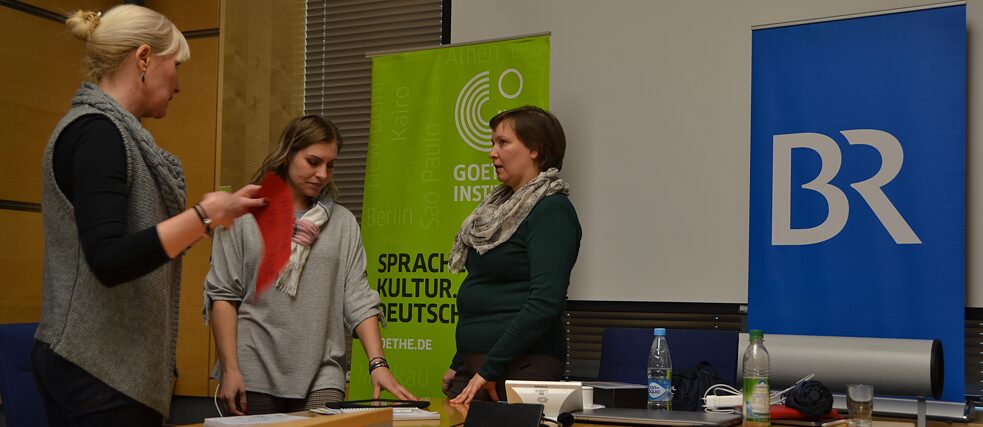Making Teachers Media Experts
What’s true and what’s false

Media expert training at the BR broadcasting centre. | Photo (detail): Gianluca Tucciarone
Eleven German lecturers from Eastern Europe were trained as media experts at the invitation of the Goethe-Institut and the BR Media Literacy Projects. For The Latest at Goethe, the Ukrainian participant Julia Taips describes her expectations of the project at the Munich broadcasting centre.
By Julia Taips
At the moment, the media world is so diverse that we no longer know what’s true and what’s false. This distinction is particularly difficult for children and teens. Young people are also the ones who will have to live with the consequences of misleading and false information in the future if they don’t learn how to deal with it at an early age.

Orientation in the midst of dangers and opportunities
Programmes and courses, such as the training as a media expert at Bayerischer Rundfunk (Bavarian Radio) in cooperation with the Goethe-Institut, give us the opportunity to expand our skills in this area not only in theory but also in practice. They encourage us to teach children and young people the importance of media literacy in an understandable way and on equal footing.Media literacy is playing an increasingly important role in Ukraine, not only among young people, but even among primary school children. Today’s young people are usually a few steps ahead of their parents and teachers when it comes to the media. I see our task as teachers in first understanding this media world ourselves and being able to deal with it in order to be able to give young people orientation in the midst of dangers and opportunities.
With Our Own Eyes
The media world in Ukraine is quite diverse. In addition to a public service television station UA: Perschij (Ukraine: The First), there are many private channels owned by oligarchs or members of parliament. The news therefore differs greatly from channel to channel.The German minority in Ukraine is endeavouring to preserve the only German editorial staff in the country at the station UA: Zakarpatja. Our programmes “Ethno Vision” and “With Our Own Eyes” are very popular. We regularly produce small posts for Facebook or YouTube for the younger generation. In contrast, the Hungarian minority has its own television and radio station in Zakarpattia, which is funded by the Hungarian government.
Access to trustworthy sources of information
As head of the organisation German Youth of Zakarpattia, I feel responsible for training media-literate young people for our society. Our aim is to provide representatives of the German minority with knowledge-based and useful information about the media world. We want to open up not only the media world of Ukraine for them, but also of Germany. Our children and teenagers travel in two cultures and should have access to professional, trustworthy and verifiable sources of information in order to form their own opinion.Julia Taips, head of the organisation German Youth of Zakarpattia, editor of the German-language programme of the Zakarpattia radio and television station Tyssa.